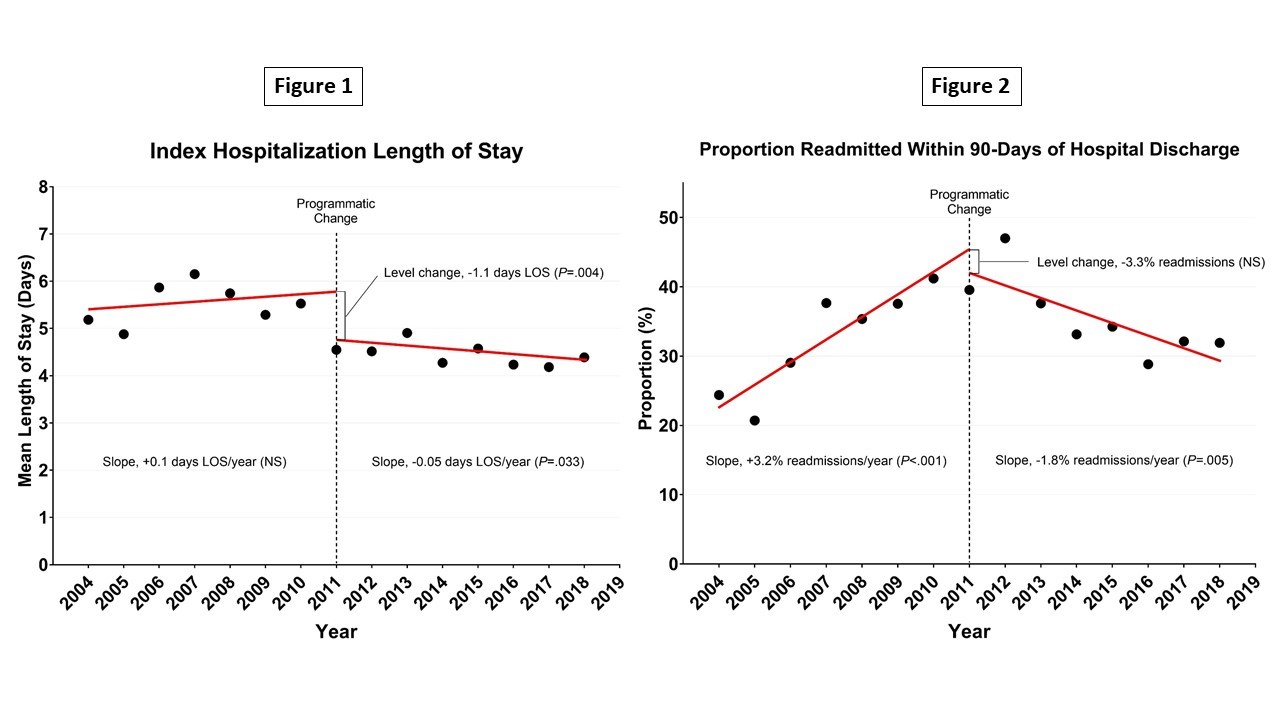Increased Transplant Surgery Advanced Practice Provider Involvement Associated with Decreased Hospital Length of Stay and Readmissions Following Kidney Transplantation
1Surgery-Section of Transplantation, University of Michigan, Ann Arbor, MI, 2Surgery, University of Michigan, Ann Arbor, MI
Meeting: 2020 American Transplant Congress
Abstract number: C-229
Keywords: Kidney transplantation, Length of stay, Outcome
Session Information
Session Name: Poster Session C: Quality Assurance Process Improvement & Regulatory Issues
Session Type: Poster Session
Date: Saturday, May 30, 2020
Session Time: 3:15pm-4:00pm
 Presentation Time: 3:30pm-4:00pm
Presentation Time: 3:30pm-4:00pm
Location: Virtual
*Purpose: Transplant surgery Advanced Practice Providers (APPs) are utilized to provide complex care to transplant patients. Daily responsibilities of APPs are broad and variable across transplant centers. In February 2011, our center increased involvement of transplant surgery APPs in the daily care of kidney transplant (KT) recipients in an effort to streamline care, focusing on the post-transplant period. We aimed to determine if this programmatic role change impacted KT recipient length of stay (LOS) and readmission outcomes.
*Methods: We conducted a retrospective review of all deceased donor KT (DDKT) and living donor KT (LDKT) recipients age ≥18 from 2004-2018 at our center. Primary outcome was index hospitalization LOS. Secondary outcome was proportion of patients readmitted within 90-days of hospital discharge. Interrupted time-series analysis was used to compare outcomes in era 1 (2004-2010, n=1,488) and era 2 (2011-2018, n=1,425). Autocorrelation was detected by Cumby-Huizinga test and accounted for in the analysis. Wilcoxon rank sum and χ2 tests were used to compare continuous and proportional data, respectively.
*Results: Of 2,913 study participants, 1,801 (61.8%) were male with a mean age of 50±17 years. Age and race were similar in both eras. We performed LDKT for 1,359 (46.7%) of patients studied. We found a lower index hospitalization LOS between era 1 (mean 5.5±5.1 days) and era 2 (mean 4.5±3.4 days) (P<.001). On interrupted time-series analysis, this difference is due to level change during the year of programmatic change (-1.1 days, 95%CI -0.4 to -1.8 days); there was no clinically-significant time trend in LOS duration in either era [Fig1]. For 90-day readmissions, programmatic change was associated with a significant time trend towards lower readmissions [Fig2]. Era 1 had an absolute +3.2% yearly increase in readmissions (95%CI +2.3 to +4.1%), whereas era 2 had an absolute -1.8% yearly decrease in readmissions (95%CI -0.6 to -3.0%), a difference of -5.1% (95%CI -3.6 to -6.6%) between eras.
*Conclusions: Programmatic change was associated with a significant reduction in length of stay and 90-day readmissions among KT recipients. We posit that regular transplant APP involvement may help standardize processes and streamline care.
To cite this abstract in AMA style:
Herriman EA, Montgomery JR, Brown KJ, Woodside KJ. Increased Transplant Surgery Advanced Practice Provider Involvement Associated with Decreased Hospital Length of Stay and Readmissions Following Kidney Transplantation [abstract]. Am J Transplant. 2020; 20 (suppl 3). https://atcmeetingabstracts.com/abstract/increased-transplant-surgery-advanced-practice-provider-involvement-associated-with-decreased-hospital-length-of-stay-and-readmissions-following-kidney-transplantation/. Accessed February 26, 2026.« Back to 2020 American Transplant Congress

